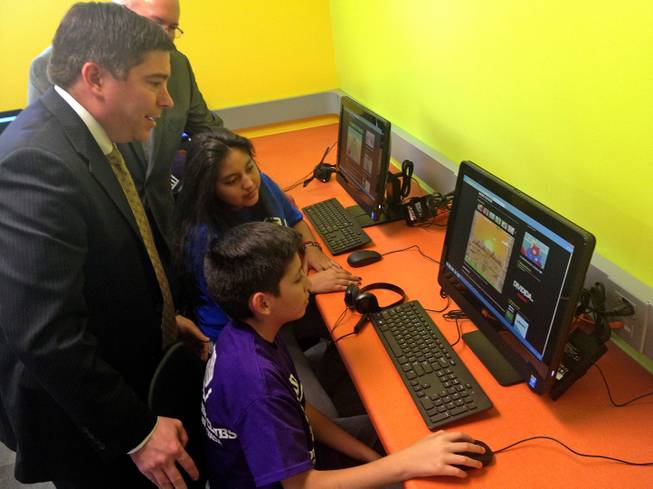
Ian Whitaker / Las Vegas Sun
FCC Commissioner Michael O’Rielly watches two kids play on computers in the newly formed Desert Pines Boys and Girls Club.
Wednesday, April 15, 2015 | 2 a.m.
Here’s a common scenario: A student is assigned a school project that requires them to go online for research.
Here’s the problem: Many students in Las Vegas don’t have access to the Internet.
If you’re a kid in a low-income family in Nevada, the data show that you probably have around a 50-50 chance of having Internet access at home. The state average is 81 percent.
In Nevada, 87,000 school-age kids don’t have access to high-speed Internet, according to Connect Nevada.
It’s an issue Clark County School District administrators have known about for years, but have been unable to do anything about.
They say programs like Cox Communications’ Connect2Compete are the best solution so far.
“Schools can break cycles of poverty for kids by moving them forward and graduating them,” said Jeffrey Gheis, achievement officer for CCSD Turnaround Zone. “But you can do it better when you have strong partners.”
The company has been offering low-cost broadband services to eligible families since 2013 in the states it operates in, but is now ramping up efforts in a Las Vegas neighborhood they say is emblematic of the “digital gap” that persists in many poor areas.
On Tuesday it cut the ribbon on an Internet-equipped technology center at a newly opened Boys and Girls Club nestled in an east valley apartment complex.
“In places like where we stand right now … the digital divide is very, very real,” said John Wolfe, Cox’ southwest regional manager.
In this ZIP code, 89101, the average family income is just $22,000. That’s $2,000 under the federal poverty line for a family of four. Around 35 percent of families in 89101 make less than $15,000 a year.
Despite that, around 70 percent of students say they rely on the Internet for school projects.
Cox has given out thousands of fliers for Connect2Compete in what it calls the Desert Pines Corridor, a roughly two-mile area around Pecos Road and Bonanza Boulevard, urging families to sign up for the program.
Particular attention has been paid to the nine district schools in the area, the majority of which have mostly students who qualify for free and reduced lunch and are still learning English.
Statistics show that 30 percent of families in low-income areas like this can’t afford Internet service.
The Cox initiative provides it to them at $10 a month, a fraction of the full price. It’s part of a long-running relationship with the Boys and Girls Club, and the only requirement is that families have at least one K-12 student in the household who is eligible for free and reduced lunch. The program has 25,000 families participating across the country.
Families who qualify could even be eligible for heavily discounted computers and laptops at under $200.
“It’s so important that we get to students early and train them as best as possible with technology,” said FCC Commissioner Michael O’Rielly. "Because they are going to be confronted with that going forward.”

Join the Discussion:
Check this out for a full explanation of our conversion to the LiveFyre commenting system and instructions on how to sign up for an account.
Full comments policy